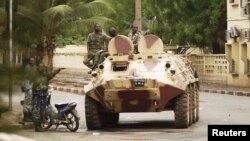LONDON - Mali is facing its worst crisis since independence in 1960 according a Britain-based human rights group. In a report published Wednesday, Amnesty International says population displacement, human rights abuses, and a region-wide food shortage have thrown the country into crisis after two decades of relative stability and peace.
During a three-week trip to Mali, Amnesty researchers recorded a litany of abuses.
In their report, they say the north of the country has been taken over by armed groups who they describe as "running riot."
Witnesses say armed Tuareg and Islamist groups have committed a range of abuses, including rape, executing soldiers, and recruiting children as young as 12 to be soldiers.
Islamist pressure
Amnesty's Salvatore Sagues co-wrote the report. He says the Islamist groups are also trying to impose new behavior on the population.
"The population is being ordered to stop drinking alcohol," he said. "The men have to wear beards. Women have to wear veils. Young people cannot listen to music unless it is a religious one. Young people cannot sit together if they are a girl and a boy who are not married. And people who disobey these orders can be very seriously sanctioned."
He says one person accused of drinking alcohol received 40 strokes on their body. According to the report, abuses are not limited to armed groups. Salvatore Sagues:
"The Malian army has also committed very serious human rights violations. They targeted the Tuareg population. They bombed indiscriminately camps and killing at least one girl aged four and also other Tuareg," said Sagues.
Uncertain political timetable
The crisis in Mali comes during a food shortage that has swept across the Sahel region and, according to the U.N. World Food Program, is impacting around 15 million people.
Army officers seized power in a March coup, saying that the government had failed to end a Tuareg-led rebellion in the north. Rebels now control two-thirds of the country.
Despite pressure from the Economic Community of West African States, or ECOWAS, and from Western donors, it's unclear when the country will be returned to full civilian rule.
Sagues says that transition is crucial if abuses in Mali are to end.
"Until this crisis is not settled in Bamako I think it will be very difficult to have a unified position in Mali concerning this crisis," he said.
During the research mission Amnesty delegates visited the Malian capital Bamako and four refugee sites in Niger.
During a three-week trip to Mali, Amnesty researchers recorded a litany of abuses.
In their report, they say the north of the country has been taken over by armed groups who they describe as "running riot."
Witnesses say armed Tuareg and Islamist groups have committed a range of abuses, including rape, executing soldiers, and recruiting children as young as 12 to be soldiers.
Islamist pressure
Amnesty's Salvatore Sagues co-wrote the report. He says the Islamist groups are also trying to impose new behavior on the population.
"The population is being ordered to stop drinking alcohol," he said. "The men have to wear beards. Women have to wear veils. Young people cannot listen to music unless it is a religious one. Young people cannot sit together if they are a girl and a boy who are not married. And people who disobey these orders can be very seriously sanctioned."
He says one person accused of drinking alcohol received 40 strokes on their body. According to the report, abuses are not limited to armed groups. Salvatore Sagues:
"The Malian army has also committed very serious human rights violations. They targeted the Tuareg population. They bombed indiscriminately camps and killing at least one girl aged four and also other Tuareg," said Sagues.
Uncertain political timetable
The crisis in Mali comes during a food shortage that has swept across the Sahel region and, according to the U.N. World Food Program, is impacting around 15 million people.
Army officers seized power in a March coup, saying that the government had failed to end a Tuareg-led rebellion in the north. Rebels now control two-thirds of the country.
Despite pressure from the Economic Community of West African States, or ECOWAS, and from Western donors, it's unclear when the country will be returned to full civilian rule.
Sagues says that transition is crucial if abuses in Mali are to end.
"Until this crisis is not settled in Bamako I think it will be very difficult to have a unified position in Mali concerning this crisis," he said.
During the research mission Amnesty delegates visited the Malian capital Bamako and four refugee sites in Niger.




